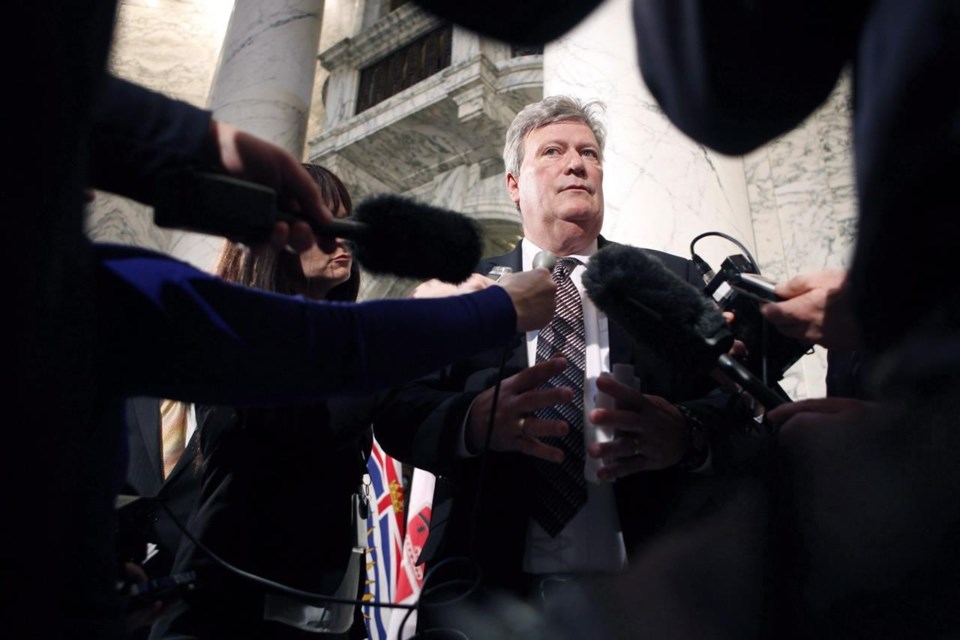VANCOUVER — British Columbia's longest-serving gaming minister was asked Wednesday if he would have done things differently to stamp out money laundering at provincial casinos.
Rich Coleman, who first assumed responsibility for gaming in 2001 and held the job off and on until 2013, testified for more than four hours at the Cullen Commission public inquiry into money laundering.
The former Liberal deputy premier rejected previous inquiry testimony by former top-ranking investigators who said Coleman was part of efforts to put gaming profits ahead of growing concerns about large amounts of suspicious cash at casinos with ties to organized crime.
"As you look back, do you look back and say, 'Here's a problem that may have developed and I might have done things differently had I had different or better information at the time?'" asked Brock Martland, a lawyer for the commission.
"Hindsight's always 20-20," said Coleman. "I didn't have better information at the time."
He said legal issues dealing with the origins of suspicious cash at casinos made it difficult to address the issue head-on, but decision-makers and those in the public service were trying to do their best.
"My question was a number of times, so if these are illicit funds, why can't we seize them?" said Coleman. "And the advice I got back is we can't prove that they are."
The New Democrat government called the inquiry in May 2019 and appointed B.C. Supreme Court Justice Austin Cullen as commissioner after three reports outlined how B.C.'s real estate, luxury vehicle and gaming sectors were being used to launder illegal cash.
Attorney General David Eby testified this week it wasn't until he was shown video in 2017 of people bringing bags of $20 bills into casinos valued at hundreds of thousands of dollars that he fully understood money laundering in action.
He said gamblers were being loaned illegal cash to use at the casinos by an organized crime group, then later repaid the loans with legitimate money as part of what became known by investigators as the Vancouver Model.
Coleman testified he "vaguely recollected" a 2009 meeting about suspicious cash at casinos with Fred Pinnock, a former RCMP officer who led B.C.'s now-disbanded integrated illegal gaming enforcement team.
"Mr. Pinnock suggests that you turned a blind eye to money laundering in casinos to avoid disrupting an important revenue stream for the government?" Martland asked Coleman.
"That was just ridiculous," Coleman said. "There was never ever, that I saw in all the time I was in government, a point where somebody said ignore a revenue stream that could be illegal for the benefit of government."
The former minister also disagreed with Pinnock's testimony from last November that Coleman yelled at former Liberal MLA Naomi Yamamoto when she asked about suspicious cash at casinos during a Liberal caucus meeting.
Pinnock and Yamamoto are partners.
"I don't yell," Coleman said. "I'm actually a very calm individual and I cannot recall a situation ever where I would have raised my voice in a caucus meeting in 24 and a half years in public life," Coleman testified.
He said he also had a different interpretation of a 2010 meeting in Burnaby with a former head of B.C.'s gaming regulator at the Gaming Policy Enforcement Branch.
Ex-Mountie Larry Vander Graaf testified last fall he sounded the alarm about stopping large amounts of suspicious $20 bills likely linked to the drug trade during a meeting with Coleman but little was done.
Coleman said the issues of suspicious cash and what could be illegal money and what wasn't were discussed at the meeting, but it was "just a back and forth."
He also denied Vander Graaf's testimony that he heard former deputy minister Lori Wanamaker say during the meeting, "Rich, we have to do something about this."
"I don't believe for a second, Ms. Wanamaker would refer to me by my first name," said Coleman. "She would have called me minister."
Wanamaker, now B.C. Premier John Horgan's deputy minister, cabinet secretary and head of the public service, also denied making the comment during testimony earlier this week.
Vander Graaf was fired in 2014.
Coleman, who served six terms in the legislature dating back to 1996, did not run in last fall's B.C. election.
The commission's final report is due Dec. 15.
- By Dirk Meissner in Victoria
This report by The Canadian Press was first published April 28, 2021.
The Canadian Press



